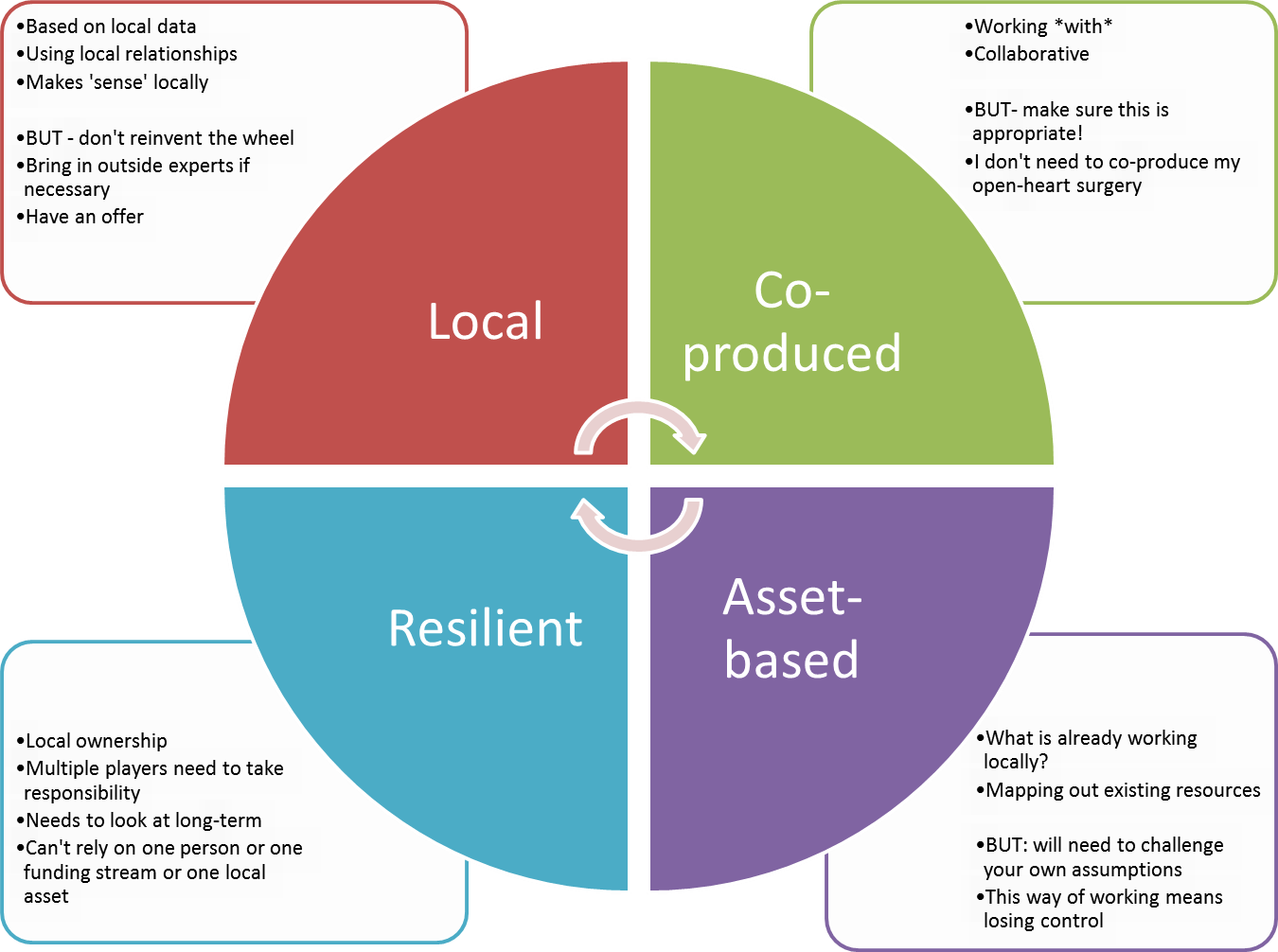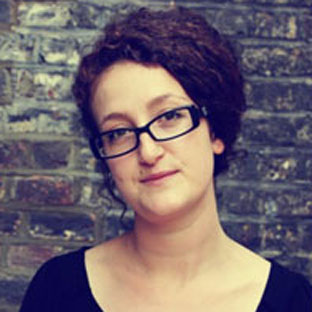Part 2 of my Five rules, Four principles, Three approaches, Two caveats and One request for social networks and community.
Four Principles:
What makes something work? What makes an Incredible Edible that is not in Todmorden, or an UnMonastery project that is not in Matera? We have found that the community projects and initiatives that work best tend to follow something along the lines of these four principles: locally specific, co-produced and collaborative, asset-based and aiming towards resilience.

1. Local: based on local data and knowledge.
Projects need to make sense where there are based: a great idea in one area will not necessarily work elsewhere. This is often the great failure in trying to make an innovative success story work elsewhere: what made it work in the first place, and how do you translate that for its new context?
However beware the fetishisation of local: local does not mean reinventing the wheel and it does not mean not bringing in external experts. You need to have an offer if you are to bother people and take their time.
In practise: in our work on the Social Inclusion and mental wellbeing project, we have worked with local stakeholders to co-produce projects in each area that are based on local data.
In Knowle West, Bristol, our co-production of the final results honed-in on data that showed that people relied on service providers for advice, and that there was a wide-spread feeling that nothing good ever happened in the area- this led to Social Mirror and a local place-finding project.
In Murton, Country Durham, the finding that really caught local stakeholders attention was that single parents had the lowest life satisfaction and mental wellbeing was lowest, and that the data showed that they responded very well to increased social connections – this led to Murton Mams.
2. Co-produced: collaborate, do not ‘provide’.
It is important to ensure that you work with local people and stakeholders in planning projects, on an equal footing. This is not the same as consultation: “you told us, we did”, is not good enough. I have lost count of the amount of times I have heard local authority figures complain that they are providing ‘n’ service or ‘n’ event and people “just don’t turn up”.
However: co-production is not always appropriate. There is a scale that runs from long-term condition to one-off crisis, intersected by one that runs from infrastructure to social structure.
The closer you are to longer-term condition and social structure the more co-production is appropriate, the closer you are to crisis and infrastructure, the more ‘the-state-as-responsible-adult' is appropriate: if you are having a heart attack you will need a non-co-produced state-led intervention to save you; to ensure you live beyond fifty, community-based services and a co-produced approach to managing your lifestyle will be most appropriate.
In practice: our community partner, the New Highfields Resident’s Group, is very effective at delivering youth and parent-and-toddler services as they do very intensive work to ensure that local residents shape their offer. It has required a lot of work to ensure that the local services see this as an asset, instead of viewing them as ‘competitor’ service providers who only have high footfall as their services are free.
However, when there are safeguarding issues, it is most appropriate that there are channels between service providers and community activities to ensure that the appropriate response is followed: this is articulated by community youth workers having self-help sessions with local council practitioners, and clear lines of communication with service providers such as care workers and the police.
3. Asset-based: trust your people and trust the process. Really working in an asset-based way is hard, and it often requires that you check your own assumptions. There is a need to link to what is already working and enhance it, and to then plug gaps or improve whatever is missing. This often takes time, and working in a truly asset-based way can be painful for local providers as they need to let go of control.
In practice: the Social Mirror project acts as a broker between local people and existing services. We use digitised Social Prescribing to link local people to community activities and groups that are already happening in their local area. Now, post-pilot, the key question will be whether the project will manage to properly integrate with existing processes, eventually becoming locally owned.
4. Resilient: build for resilience and sustainability. Projects need to ultimately be owned by a broad enough range of local stakeholders to ensure their survival over the medium to long-term. In ecological terms, resilience is the capacity of system to withstand shocks. In network terms, resilience means that the key players and drivers around a project need to be sufficiently intertwined and diverse that people – and funding streams! – can come in and out of the fore without the project falling over. A project with one key person driving it forward is just as fragile as a project with only one possible revenue stream.
In practice: our research in Littlehampton highlighted a handful of key community players who were known to get things done. By working with the national Community Organisers programme, 5 local people were recruited to door- knock locally over a year, engaging with around 500 people each and aiming to surface and jump-start civic activity. We are just coming up to the end of the year, a local resident-led campaign to challenge housing being built on local green spaces is just one of many different projects that have spun out thanks to our organisers.
If you found this interesting, follow me and stay tuned for Three approaches, Two caveats and One request!
Part 1: Five community rules, can be found here
_________________________________________________
Gaia Marcus is a Senior Researcher on the RSA Connected Communities project.
She is an Edgeryder and an UnMonk advisor, founded the RSA Social Mirror project and is ¼ of the ThoughtMenu.
This Summer she will be cycling 1000km in memory of our RSA colleague Dr Emma Lindley and
You can find her on twitter @la_gaia
Related articles
-
Will Covid-19 transform local public services?
Joan Munro
The way local public sector leaders pulled together has created an opportunity for transformational changes.
-
Glasgow and Pittsburgh: cities of steel
Jamie Cooke
New partnership between two cities with a bright future.
-
Changing how we see heritage can help us build back better
Becca Antink
How the heritage sector is making a difference in local communities.




Be the first to write a comment
Comments
Please login to post a comment or reply
Don't have an account? Click here to register.